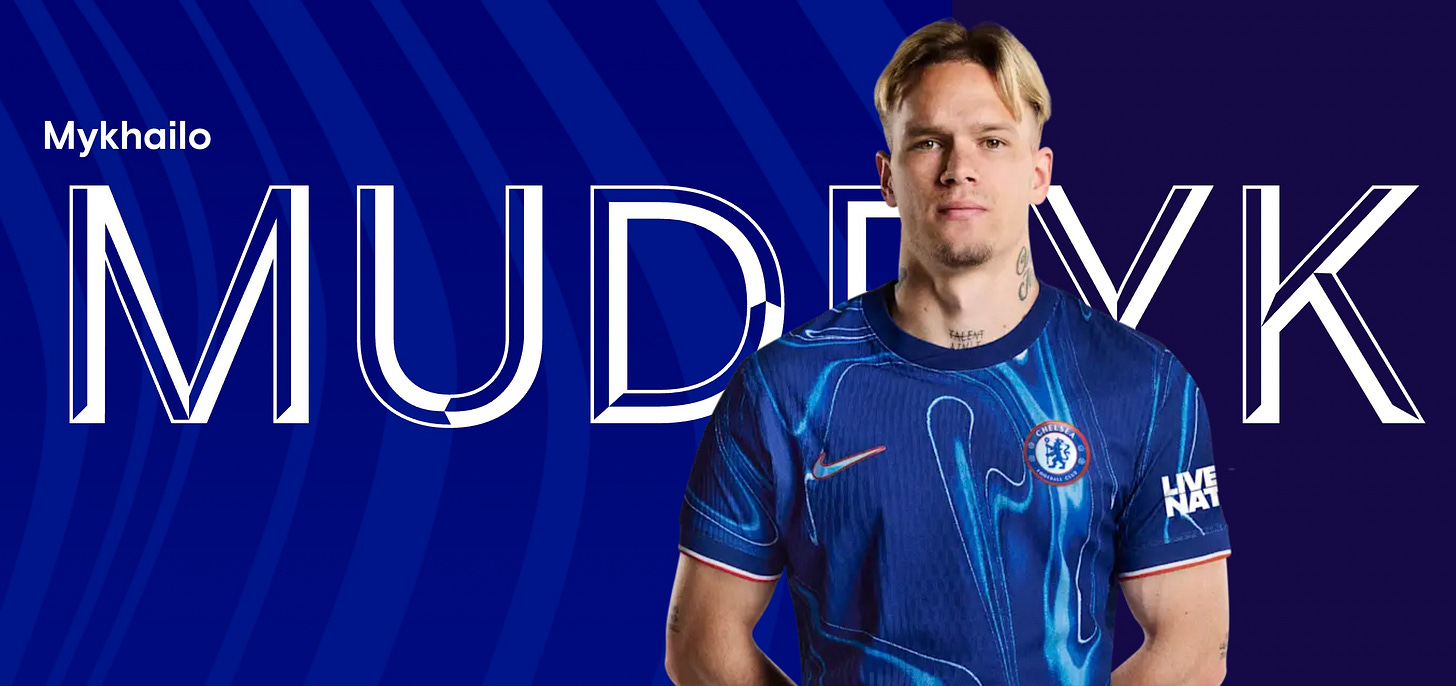Mudryk and meldonium: the odds for the Chelsea star look ominous after FA charge
The Ukrainian winger could become the first Premier League player in 20 years to be banned after testing positive for a prohibited performance-enhancing substance.
Ed Willison has worked with Sporting Intelligence for almost a decade and has worked collaboratively with editor Nick Harris for much of that time on major investigations into doping in sport for this website and for the Mail on Sunday. Ed’s own Substack, highly recommended, is here.
“They are both slowly getting better but as we said the other day, it is a matter of weeks. The other one that is still ill is Misha Mudryk and the rest are okay.”
This was the reason given by the Chelsea manager Enzo Maresca in early December for why the Ukrainian winger Mykhailo Mudryk had missed the club’s recent matches.
It then emerged Mudryk (below) had failed a recent doping test for the heart medication meldonium, and had been provisionally suspended. Mudryk has since been unable to play at Stamford Bridge, or indeed anywhere, until his case is resolved or his provisional suspension is overturned.
More than six months on, Mudryk has not kicked a ball in any competitive arena since Chelsea’s 2-0 win at Heidenheim of Germany in the UEFA Conference League in late November. He scored in that game.
It is increasingly unclear when he might score again, or indeed play again, as he faces a potential doping ban that could be as long as four years.
His club is currently in the USA, where they have reached the quarter-finals of the Club World Cup, and will face Palmeiras of Brazil in the last eight in Philadelphia on Friday.
On 18 June, the 24-year-old Ukrainian winger was charged by the Football Association with violating anti-doping rules. "We can confirm that Mykhailo Mudryk has been charged with anti-doping rule violations alleging the presence and/or use of a prohibited substance, in terms of regulations 3 and 4 of the FA's anti-doping regulations,” the FA said.
"As this is an ongoing case, we are not in a position to comment further at this time."
In a statement released shortly after the news of Mudryk’s positive test in December, the player denied wrongdoing and remains hopeful that he “will be back on the pitch soon”.
Unfortunately for Mudryk, the fact his case has been publicly disclosed has perhaps statistically placed the player’s career in greater peril.
Under the Football Association (FA) anti-doping regulations, provisional suspensions are not announced by either the FA or UK Anti-Doping. Doping cases involving Premier League footballers are dealt with behind closed doors, in a private arena with zero public scrutiny.
Between 2015 and 2020, 100% of Premier League footballers who failed doping tests avoided a suspension. Only the former Hull City player Jake Livermore’s cocaine case, which was also leaked, was made public. Livermore was also the only player to be sanctioned over the period although he avoided a ban.
Drugs bans for Premier League footballers have been few and far between. Two Chelsea players, Mark Bosnich and Adrian Mutu, served bans after testing positive for cocaine.
Abel Xavier of Middlesbrough, was the first and last Premier League player ever to be banned for taking a banned performance-enhancing substance. The Portuguese defender tested positive in late 2005 for the anabolic steroid methandrostenolone, also known as dianabol.
Manchester City’s Kolo Touré was banned for six months in 2011 after testing positive for a prohibited substance believed to be a diuretic (not in itself performance-enhancing) after taking his wife's diet pills. He argued this was an attempt to control his weight.
Numerous other footballers who have played in the Premier League have served bans for performance-enhancing drugs or prohibited drug-related activity, before or after playing in the Premier League. Jaap Stam, André Onana and Paul Pogba are among that group.
The odds don’t look favourable for Mudryk now he has been charged by the FA.
In athletics, a sport in which provisional suspensions have been publicly announced since 2017, 62% of athletes who failed drug tests were sanctioned by World Athletics between 2017 and 2020.
Regardless of this statistical anomaly, it is now Mudryk’s task to win over both anti-doping officials, and the wider sporting public.
Mudryk is reported to have hired the same legal team that recently helped Paul Pogba reduce his doping ban from four years to eighteen months at the Court of Arbitration for Sport.
Both Chelsea and the player are actively investigating the source of his positive test. For Chelsea, this is a procedure which the club’s medical staff has past experience of.
“This has come as a complete shock as I have never knowingly used any banned substances or broken any rules, and am working closely with my team to investigate how this could have happened,” said Mudryk in a statement on hisInstagram after his positive test.
Coincidentally, one of Chelsea’s principal club doctors had to face two doping contamination cases when he was a team doctor in another sport.
This article, and the further detail, now continues for paid subscribers below.





